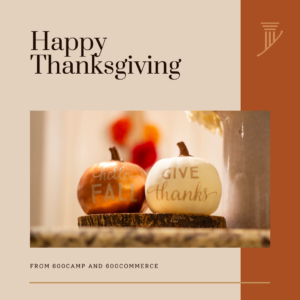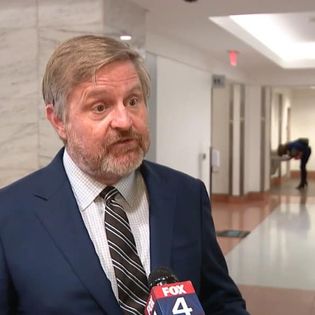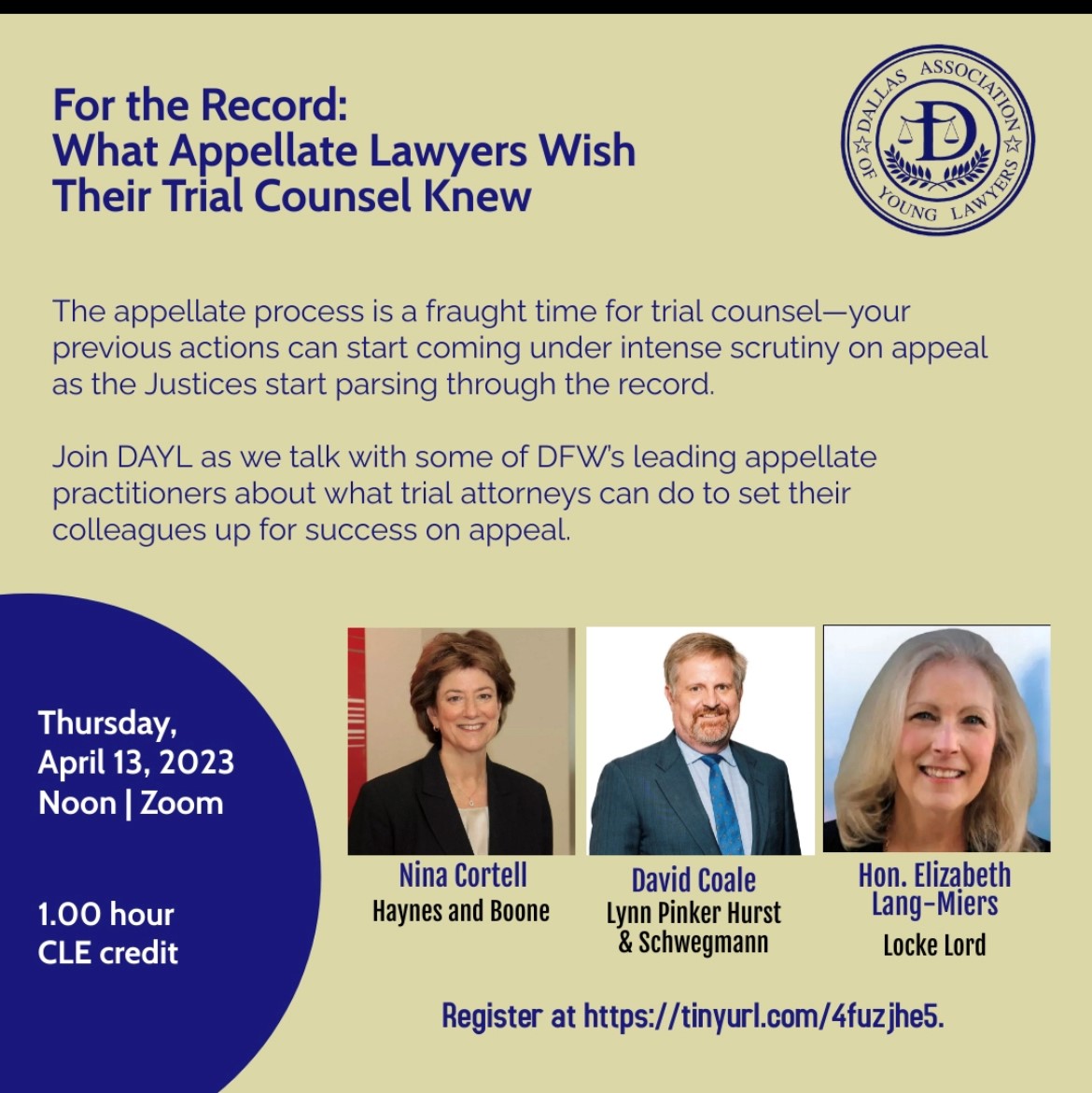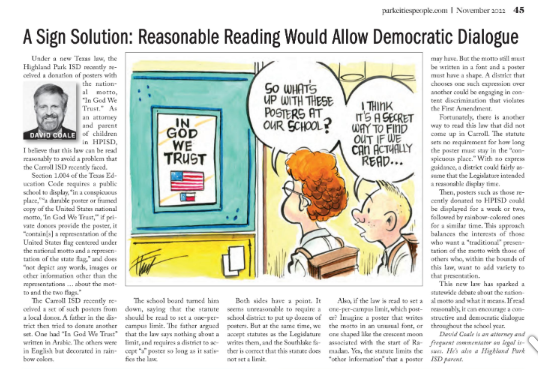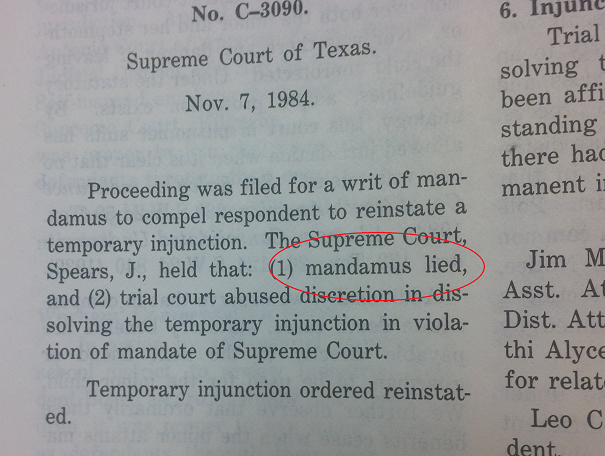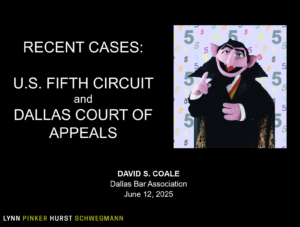 Today I did my yearly “Fifth and Fifth” update, on cases of interest to commercial litigators from the Fifth Circuit and Fifth District. This is a printout of my PowerPoint. In particulary, it was interesting to see how those two court are dealing with the Supreme Court’s recalibration of personal jurisdiction in the 2021 Ford Motor case.
Today I did my yearly “Fifth and Fifth” update, on cases of interest to commercial litigators from the Fifth Circuit and Fifth District. This is a printout of my PowerPoint. In particulary, it was interesting to see how those two court are dealing with the Supreme Court’s recalibration of personal jurisdiction in the 2021 Ford Motor case.
Category Archives: 600Commerce
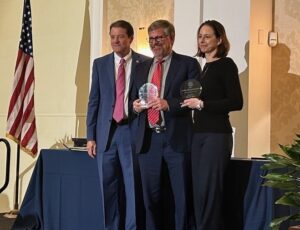 Last Friday I received the inaugural “Lawyer’s Lawyer” award from the Dallas Bar Association, described by President Bill Mateja as a lawyer who “eats, breathes, and sleeps law” in comment and public thought about it. (Next to me is Courtney Marcus, filling in for Glenn West, who also received it.) Many thanks to Bill and the DBA, and to readers of this blog: longtime or new; enthusiastic or not!
Last Friday I received the inaugural “Lawyer’s Lawyer” award from the Dallas Bar Association, described by President Bill Mateja as a lawyer who “eats, breathes, and sleeps law” in comment and public thought about it. (Next to me is Courtney Marcus, filling in for Glenn West, who also received it.) Many thanks to Bill and the DBA, and to readers of this blog: longtime or new; enthusiastic or not!
If you enjoyed my article in the Cornell Law Review Online earlier this year about the party-presentation principle, hopefully you will also enjoy a new article of mine in the Texas Law Review Online. Examining cases from the 2023-24 Supreme Court term, it considers whether “originalism” and modern economic theory can comfortably coexist.
 Your faithful blogger has been in Scotland the last few days, visiting the University of St. Andrews with my daughter. For inexplicable reasons, Scottish wi-fi services uniformly block the websites of the Texas Supreme Court and the Dallas Court of Appeals. Commentary will resume this week upon my return!
Your faithful blogger has been in Scotland the last few days, visiting the University of St. Andrews with my daughter. For inexplicable reasons, Scottish wi-fi services uniformly block the websites of the Texas Supreme Court and the Dallas Court of Appeals. Commentary will resume this week upon my return!
Please join the Dallas Bar Association Appellate Section at noon on Thursday, January 18, for a lunch presentation by me. I’ll be speaking on trends and cases to know from the past year in the U.S. Court of Appeals for the Fifth Circuit and the Fifth District Court of Appeals. I’ve done a similar presentation around this time of year for a few years now.
Here’s my PowerPoint. This CLE will be in-person at the Arts District Mansion, 2101 Ross in downtown Dallas.
 The Bar Association of the Fifth Federal Circuit is the bar association to belong to if you’re interested in the work of the U.S. Court of Appeals for the Fifth Circuit. More information about member benefits is detailed on the BAFFC’s website. One of those benefits is a terrific set of short (c. 500 word) articles about appellate practice (here’s an example that I did about a year ago on oral-argument preparation).
The Bar Association of the Fifth Federal Circuit is the bar association to belong to if you’re interested in the work of the U.S. Court of Appeals for the Fifth Circuit. More information about member benefits is detailed on the BAFFC’s website. One of those benefits is a terrific set of short (c. 500 word) articles about appellate practice (here’s an example that I did about a year ago on oral-argument preparation).
Please consider writing one yourself! A link will be emailed out several times to the BAFFC’s thousands of members, as part of its daily updates about recent decisions, and it’ll be available to the membership online as part of the full collection of these pieces. Contact BAFFC administrator Mary Douglas at mary@baffc.org!
Together with the able Ben Taylor, I have an article in the most recent Baylor Law Review called “Judgment Rendition in Texas.” The abstract is below. Our article was inspired by a 1975 article by Justice Robert Calvert in the Texas Tech Law Review called “Appellate Court Judgments or Strange Things Happen on the Way to Judgment.” We hope that we updated some of his insights for modern-day appellate practice.
In the latest Baylor Law Review, you can read an article that I co-wrote with the capable Ben Taylor called “Judgment Rendition in Texas” – here’s a link, and this is the abstract:
.
I’m on a summer vacation road trip, blog posts will resume upon my return next week! I hope you are having an enjoyable summer with quality air conditioning. I also recommend that you see “Oppenheimer” — with or without seeing “Barbie” — as it offers some powerful insights about civil procedure run amok in Oppenheimer’s security-clearance hearings.
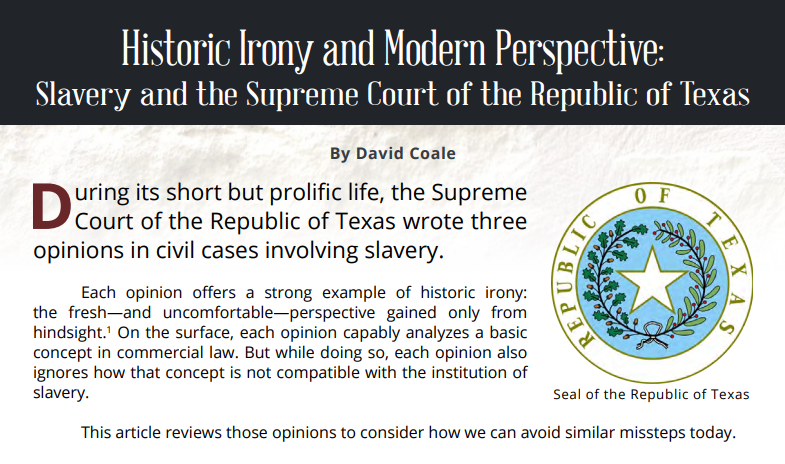 Back during the pandemic, I got a copy of “Dallam’s Decisions.” It’s a one-volume work with the opinions of the short-lived Supreme Court of the of Texas (1840-45, give or take). It’s fascinating stuff, some of that court’s work is terrible, and some is really insightful.
Back during the pandemic, I got a copy of “Dallam’s Decisions.” It’s a one-volume work with the opinions of the short-lived Supreme Court of the of Texas (1840-45, give or take). It’s fascinating stuff, some of that court’s work is terrible, and some is really insightful.
I wrote down some notes about how that court dealt with slavery, and recently turned those notes into a short article.
It just came out in the “Journal of the Texas Supreme Court Historical Society,” and you can read it starting at page 75 of this link. As you can see, I think those cases offer some good insights about our world, as well as that of the 1840s.
i had an op-ed in yesterday’s Dallas Morning News about the proposal for a new 15th Court of Appeals as part of a new “business courts” system for civil litigation.
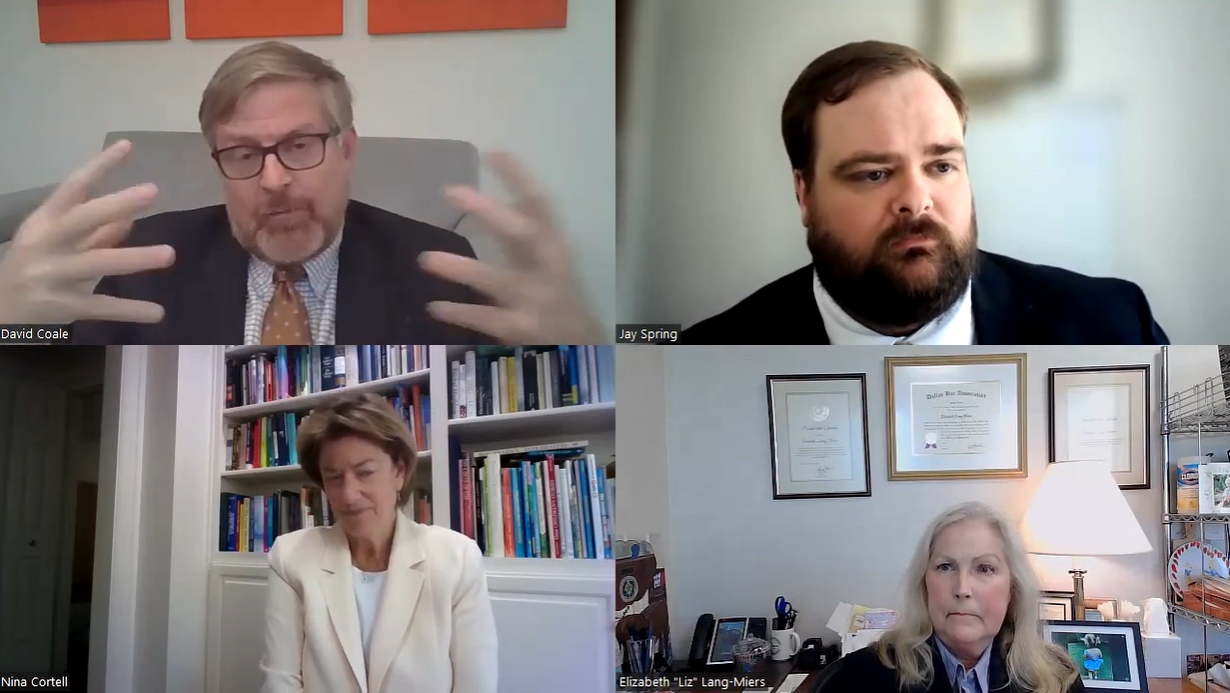 If you missed it, fear not! The CLE panel that I was on last week for DAYL is now on Zoom for your enjoyment and self-study CLE credit.
If you missed it, fear not! The CLE panel that I was on last week for DAYL is now on Zoom for your enjoyment and self-study CLE credit.
I’m part of a fun online CLE tomorrow April 13 at noon sponsored by the Dallas Association of Young Lawyers, about “what appellate lawyers wish trial counsel knew.” You can register here on the DAYL website.
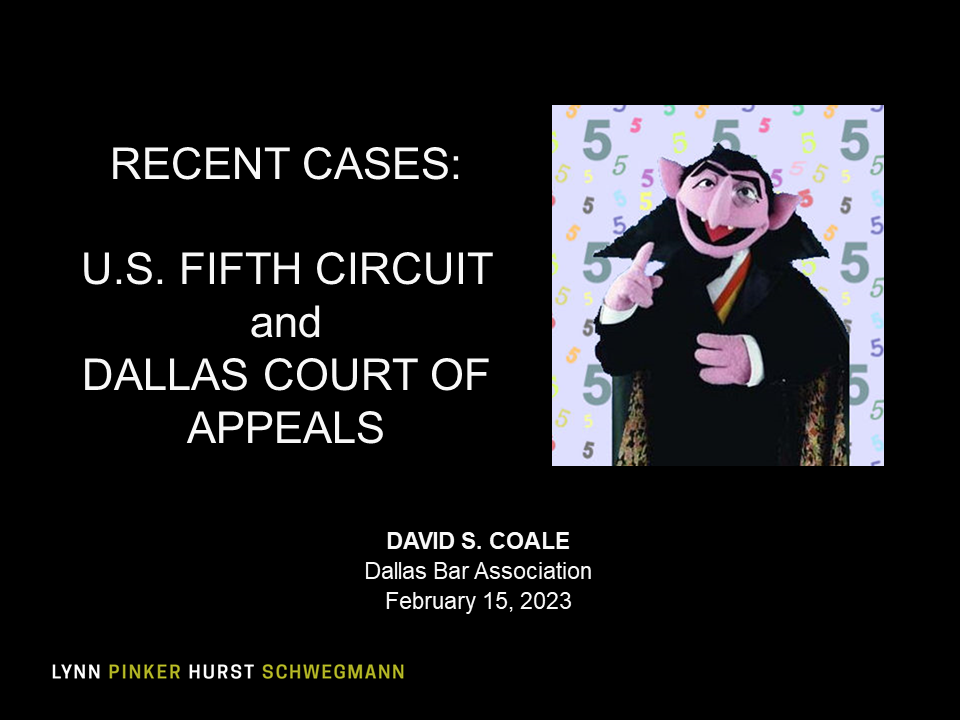 On Wednesday at noon, I am doing a virtual CLE for the Dallas Bar that reviews the key cases, since last spring, from the U.S. Court of Appeals for the Fifth Circuit and the Fifth Court of Appeals in Dallas. You can register here and you can download (subject to last-minute revisions) my PowerPoint here. I hope you can join me!
On Wednesday at noon, I am doing a virtual CLE for the Dallas Bar that reviews the key cases, since last spring, from the U.S. Court of Appeals for the Fifth Circuit and the Fifth Court of Appeals in Dallas. You can register here and you can download (subject to last-minute revisions) my PowerPoint here. I hope you can join me!
 Now available! My (free) e-book, “Originalism Ascendant,” which builds upon recent media appearances to describe where the Constitution finds itself, for the rest of the 2020s, after the overruling of Roe v. Wade.
Now available! My (free) e-book, “Originalism Ascendant,” which builds upon recent media appearances to describe where the Constitution finds itself, for the rest of the 2020s, after the overruling of Roe v. Wade.
Topics include:
- How clear are the guidelines for state laws about abortion activity in another state?
- Will Lochner make a comeback?
- If so, what body of academic thought will provide guidance for the courts?
- What would Alexander Hamilton really think about modern economic regulation?
- Who exactly are “the people’s elected representatives” referred to by the Supreme Court in Dobbs?
I hope you enjoy my ideas and find them helpful in your own thinking about these important issues!
I’m in the newest issue of Park Cities People, talking about the “Poster Wars” under the new Texas law about posters that feature the national motto:
Today, a birthday cross-post from sister blog 600Camp:
Today 600Camp celebrates its 11th birthday! For old times’ sake, here is the 10th-anniversary post from last year. Stir up some Shrimp Remoulade to celebrate properly!
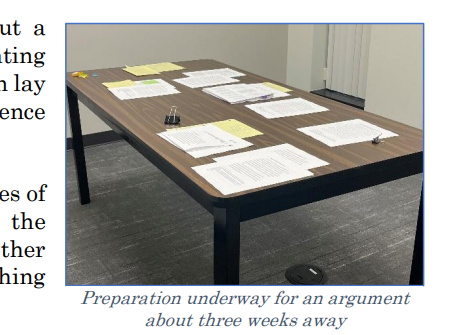 For August’s end-of-month summary by the Fifth Circuit Bar Association, I contributed a one-page article about preparation for oral argument, complete with action picture (right), joining a similar one contributed last month by Association president Tom Flanagan of New Orleans. If you belong to the BAFFC, I encourage you to write one of your own! And if you don’t belong you should, it’s a great resource and features an outstanding body of work about the Fifth Circuit by the able Walter Woodruff, also of New Orleans.
For August’s end-of-month summary by the Fifth Circuit Bar Association, I contributed a one-page article about preparation for oral argument, complete with action picture (right), joining a similar one contributed last month by Association president Tom Flanagan of New Orleans. If you belong to the BAFFC, I encourage you to write one of your own! And if you don’t belong you should, it’s a great resource and features an outstanding body of work about the Fifth Circuit by the able Walter Woodruff, also of New Orleans.
Our firm again achieved Chambers & Partners Band One status this year for commercial litigation in the D/FW area; my partner Mike Lynn and I wrote the lead article introducing this year’s rankings and talking about our area’s strong economy and legal market.
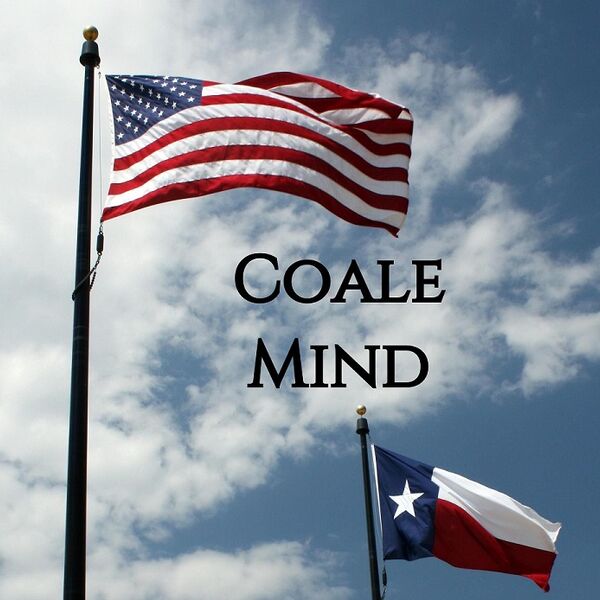 You may enjoy my latest (and short!) podcast episode, Originalism and its Discontents, which compares:
You may enjoy my latest (and short!) podcast episode, Originalism and its Discontents, which compares:
- the Fifth Circuit’s May 2022 opinion in Jarkesy v. SEC, which held that the Seventh Amendment’s right to civil jury trial extends to an SEC enforcement action (although the SEC did not exist in 1791), and
- the draft Supreme Court majority opinion in Dobbs (which held that the Fourteenth Amendment did not protect an abortion right in 1868, although the vast majority of women could neither vote nor own property at that time).
The episode concludes that historical analogies, made in the name of “originalism,” may not be a faithful application of that technique for constitutional reasoning, when the historical context differs substantially from our own.
I’ll be speaking at the Dallas Bar Association’s downtown headquarters next Tuesday, May 10, at noon, to give an update on notable cases in the past year from both the U.S. Court of Appeals for the Fifth Circuit and the Dallas Court of Appeals
 I recently wrote a short piece for the UK’s Solicitor’s Journal about two recent personal-jurisdiction cases of note–one from the Fifth Circuit and one from the Dallas Court of Appeals–which it published as an “international insight” and titled “How to Deal with Texas Businesses Without getting Sued.”
I recently wrote a short piece for the UK’s Solicitor’s Journal about two recent personal-jurisdiction cases of note–one from the Fifth Circuit and one from the Dallas Court of Appeals–which it published as an “international insight” and titled “How to Deal with Texas Businesses Without getting Sued.”
Last Friday I spoke to the Dallas Area Paralegal Association about preparing a case for appeal in Texas state court. We covered, among other topics, the mechanics of preparing a notice of appeal (including the deadline!), ordering the clerk’s record, and ordering a reporter’s record that’s complete in all respects. Here is my PowerPoint.
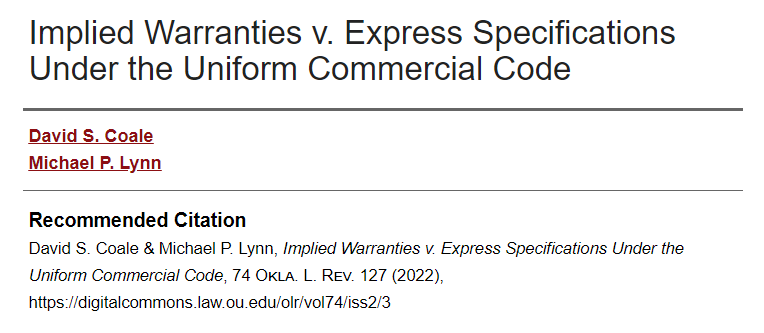 Mike Lynn and I have an article in the latest Oklahoma Law Review about a fiendishly tricky issue with some “battles of the forms” under the Uniform Commercial Code. A few years back, Mike had a hard-fought trial about this issue in the context of the roof insulation for a big warehouse near D/FW Airport. I hope you enjoy it – and can use it someday in your next UCC case – https://digitalcommons.law.ou.edu/olr/vol74/iss2/3
Mike Lynn and I have an article in the latest Oklahoma Law Review about a fiendishly tricky issue with some “battles of the forms” under the Uniform Commercial Code. A few years back, Mike had a hard-fought trial about this issue in the context of the roof insulation for a big warehouse near D/FW Airport. I hope you enjoy it – and can use it someday in your next UCC case – https://digitalcommons.law.ou.edu/olr/vol74/iss2/3
 By popular demand, the nationally respected jury consultant Jason Bloom returns to the “Coale Mind” podcast after his insightful interview last year about the restart of jury trials after the 2020 quarantines. In this new 2022 episode, he discusses his insights from the continued return of jury trials.
By popular demand, the nationally respected jury consultant Jason Bloom returns to the “Coale Mind” podcast after his insightful interview last year about the restart of jury trials after the 2020 quarantines. In this new 2022 episode, he discusses his insights from the continued return of jury trials.
Jason describes how, across the country, prospective jurors are more eager to be selected and serve on juries than ever before, reflecting a national mood that wants to reassert control over government after many months of uncertainty and frustration. Relatedly, jury deliberations are emphasizing a theme of “accountability”–examining which party to a case has demonstrated responsibility for its actions and decisions.
Obviously important for trial lawyers, Jason’s insights are also critical to understanding America’s political dialogue as society continues to reawaken after the COVID pandemic. Whether acting as jurors, voters, or customers, decisionmakers bring very specific interests and desires to 2022 that must be understood and accommodated to make effective policy.
The Texas Lawbook recently published a good feature by Androvett Legal Media & Marketing about the top Texas legal stories of 2021 (in which I discuss the hard-fought litigation about SB8, the new Texas abortion law). It’s worth a look while preparing for law practice in this New Year.
Yes, it’s kind of a pain, and yes, it comes around every year. But you have a voice in the oft-cited “Super Lawyers” awards, and you can make it heard on the Super Lawyers’ website. Nominations are due by December 16, 2021.
Yes, it’s kind of a pain, and yes, it comes around every year. But you have a voice in the oft-cited “Super Lawyers” awards, and you can make it heard on the Super Lawyers’ website. Nominations are due by December 16, 2021.
 The annual Appellate Judges Education Institute, hosted by the Appellate Judges Conference, an arm of the American Bar Association’s Judicial Division, will be held November 11-14, 2021, at the Hyatt Regency in Austin, Texas. This Appellate Summit offers four days of advanced-level appellate educational programming and is the largest nationwide gathering of appellate jurists and advocates. The most recent Summit sold out and the ABA had to cut off registrations early. Early-bird registration for the 2021 Summit is now open through October 15, 2021. Over 100 judges from throughout the country have already signed up for the Summit.
The annual Appellate Judges Education Institute, hosted by the Appellate Judges Conference, an arm of the American Bar Association’s Judicial Division, will be held November 11-14, 2021, at the Hyatt Regency in Austin, Texas. This Appellate Summit offers four days of advanced-level appellate educational programming and is the largest nationwide gathering of appellate jurists and advocates. The most recent Summit sold out and the ABA had to cut off registrations early. Early-bird registration for the 2021 Summit is now open through October 15, 2021. Over 100 judges from throughout the country have already signed up for the Summit.
This year’s summit features speakers on the following topics, among others:
- How Judges Read in an E-filing Era
- Top-Notch Oral Argument Answers
- Managing Stress and Strengthening Resiliency: Practical Strategies for Judges and Lawyers
- Building and Growing an Appellate Practice
- Supreme Court Preview
- Writing from the Reader’s Perspective: How the English Language Really Works
- United States Supreme Court Civil Update
- Storytelling for Advocates and Judges: How and Why We Should Incorporate Storytelling Techniques and Themes into our Work
Panelists include:
Erwin Chemerinsky, Dean of the University of California, Berkeley, School of Law
Hon. Nathan Hecht, Chief Justice, Texas Supreme Court
Hon. Bridget Mary McCormack, Chief Justice, Michigan Supreme Court
Hon. Albert Diaz, United States Court of Appeals for the Fourth Circuit
Hon. James Earl Graves Jr., United States Court of Appeals for the Fifth Circuit
Hon. Consuelo Callahan, United States Court of Appeals for the Ninth Circuit
Hon. Steven H. David, Indiana Supreme Court
Hon. Marsha Ternus, former Chief Justice, Iowa Supreme Court
Hon. Samuel A. Thumma, Arizona Court of Appeals
Hon. Martha Warner, Fourth District Court of Appeal, Florida
Hon. David W. Ellis, Illinois Court of Appeals and best-selling author
Kannon K. Shanmugam, Partner, Paul, Weiss, Rifkind, Wharton & Garrison LLP
George Gopen, Ph.D., Professor Emeritus of the Practice of Rhetoric, Duke University & Consultant on Writing the English Language
The summit will be taking place in a hotel that will easily accommodate social distancing for attendees and presenter. The ballroom boasts over 14,000 square feet and a ceiling height of 22 feet. It is rated to hold more than 1,000 attendees during normal times, but will be capped at 400 attendees. Round tables will be set with no more than 4-5 seats instead of the usual 7 to 8. The opening reception at the Bullock Museum will be held in the museum’s Grand Lobby, which has a capacity of 600. Additionally, a color coding system, to reflect your social distancing preference, will be offered at registration. Meals also will have enhanced safety measures.
For further details on speakers, programs, and registration, go to: https://lnkd.in/exxjtGjA.
